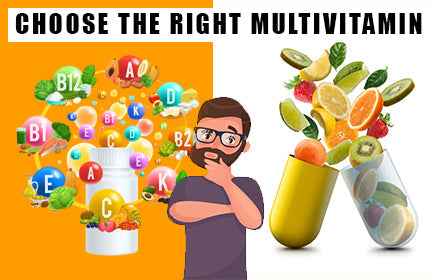Memory Support: A Review of Ingredients
Healthmasters’ Memory Support was formulated with one thing in mind: cognitive function.
This product has a combination of nutrients, vitamins, and botanicals that promote healthy cognitive function, through supporting a healthy and active memory.
In this article, we will be reviewing the ingredients of Healthmasters’ Memory Support and how each component targets and promotes a specific cognitive function.*
Blend of B Vitamins: B6, B9, and B12
Numerous studies have investigated the effects these three B vitamins have on cognitive health.
Homocysteine is a common amino acid in the brain, and the combination of these three vitamins have shown in studies to keep homocysteine levels in a normal range, which is associated with normal cognition [1] [2] [3] [4] [5].
In a 2011 study, researchers found that the supplementation of these B vitamins appeared to slow cognitive and clinical decline in people with mild cognitive impairment, in particular in those with elevated homocysteine [2].
Also, a 2006 study found that dietary vitamin B6 consumption is inversely correlated to an elevated risk of Parkinson’s disease [6].
Regarding B9, which is folate, a 2015 study found that folate intake below the recommended daily allowance may increase the risk for mild cognitive impairment and probable dementia in later life [7].
For B12, a 2010 study found that vitamin B12 deficiency may be implicated in Alzheimer’s disease [8], and a 2008 study found that vitamin B12 deficiency is associated with various reversible forms of cognitive impairment and neurological syndromes [9].
Since low levels may be indicative of an increased risk of Alzheimer’s disease, and vitamin B12 levels in the brain have been shown to decrease with age, [10] supplementing with B12 is vitally crucial for cognitive health.
Not only is it essential to supplement with B6, B9, and B12, it is crucial to supplement with the right forms of these vitamins. In this product, B6 is in the form pyridoxal 5’-phosphate, B9 is in the form 5-MTHP, and B12 is in the form methylcobalamin. Having these vitamins in these methylated forms is essential for proper absorption and bioavailability [11].
To review, the combination of B6, B9, and B12 promotes healthy cognitive function through regulation of homocysteine levels, and lower levels of these vitamins are associated with increased risks of cognitive complications.
N-Acetyl-L-Cysteine (NAC), Acetyl-L-carnitine, Phosphatidylserine (PS)
NAC is a compound that can cross the blood-brain barrier and is known to have antioxidant properties through combating oxidative stress. Lower oxidative stress in the brain has been found to support healthy nerve tissue [12].
Additionally, L-carnitine is essential for proper mitochondrial function and cellular energy production in the brain. Acetyl-L-carnitine, which is an ester of L-carnitine, has been examined because of its constructive role regarding brain neuropathology in aging adults [13] [14].
Studies have found that Acetyl-L- carnitine improved depression in some instances [15] [16], and a 2011 study found that Acetyl-L-carnitine was effective in the treatment of early stages of Alzheimer’s disease and vascular dementia [17].
Additional studies have confirmed Acetyl-L-carnitine’s neuroprotective effects [18] [19] [20].
Lastly, the phospholipid PS plays a critical role in managing proper levels of acetylcholine, dopamine, and noradrenaline in the brain. PS appears to promote neurological health and healthy brain function through its effect on cytokine production [21].
PS supplementation has demonstrated in various studies to improve cognition [22] [23] [24] [25], have a therapeutic effect in Alzheimer’s disease [26] [27], and reduce stress and improve mood [28] [29].
To summarize, the combination of these three ingredients promotes healthy cognitive function through reducing oxidative stress in the brain, improving neuroprotective effects, and managing levels of certain hormones to encourage a good mood.
Ginkgo Biloba
This plant lead has two main bioactive parts: ginkgoflavonglycosides (24%) and terpene lactones (6%). The formulation of these specific percentages created the perfect balance to ensure effectiveness. This plant has been shown to have antioxidant, antihypoxic, and microcirculatory properties [30].
Studies have found Ginkgo biloba to have positive effects regarding cognition.
A 2014 meta-analysis found that supplementing with a large dose of Ginkgo biloba extract is effective and safe in the treatment of dementia [31].
A 2009 study found that Ginkgo biloba compared favorably to the drug Aricept for the treatment of Alzheimer’s disease and dementia but without any of the negative side-effects [32].
Many additional studies have confirmed Ginkgo biloba’s support for people with dementia and age-associated cognitive impairment [33] [34] [35] [36].
Additionally, a 2016 study concluded that the plant seemed to slow down the cognitive deterioration in patients with vascular cognitive impairment [37], which is probably due to its microcirculatory properties.
Further studies have also supported its memory-supporting effects [38] [39] [40] [41] [42].
To summarize, Ginkgo biloba promoted healthy cognitive function through its antioxidant and microcirculatory properties.
Vinpocetine
This ingredient is derived on vincamine, an element from the periwinkle plant. It is commonly used to support cerebrovascular health and healthy mental function because of its effects regarding blood circulation and antioxidant activity in the brain [43] [44] [45].
Many human studies have demonstrated that vinpocetine promoted positive neurological function relating to healthy blood flow in the brain and cellular metabolism [46] [47] [48] [49] [50].
Huperzine (HupA)
HupA’s effects are similar to vinpocetine in that they both affect ion channels.
A 2010 study found that HupA appeared to have beneficial effects on improvement of cognitive function [51], and additional studies have supplementary results regarding dementia, Alzheimer’s disease, and general neurological function [52] [53] [54] [55] [56] [57] [58] [59].
Conclusion
To summarize the extensive literature presented, the specific ingredients in Healthmasters’ Memory Support have clinically demonstrated to have neurological promoting effects through various mechanisms, including antioxidant and circulatory functions. Additionally, numerous studies have proposed the efficacy of several of these ingredients with patients who have severe neurological ailments, including age-related neurological diseases, such as dementia and Alzheimer’s disease.
If you have any additional questions about Healthmasters’ Memory Support, please feel free to call our office at 800.726.1834.
References:
[1] http://www.ncbi.nlm.nih.gov/pubmed/26420127
[2] http://www.ncbi.nlm.nih.gov/pubmed/21780182
[3] http://www.ncbi.nlm.nih.gov/pubmed/19384265
[4] http://www.ncbi.nlm.nih.gov/pubmed/18089344
[5] http://www.ncbi.nlm.nih.gov/pubmed/18289028
[6] http://www.ncbi.nlm.nih.gov/pubmed/16864826
[7] http://www.ncbi.nlm.nih.gov/pubmed/25201007
[8] http://www.ncbi.nlm.nih.gov/pubmed/20110595
[9] http://www.ncbi.nlm.nih.gov/pubmed/18350363
[10] http://www.ncbi.nlm.nih.gov/pubmed/28202095
[11] https://healthmasters.com/importance-methylated-b-vitamins
[12] https://www.ncbi.nlm.nih.gov/pubmed/12603840
[13] https://www.ncbi.nlm.nih.gov/pubmed/15363640
[14] https://www.ncbi.nlm.nih.gov/pubmed/17622567
[15] http://www.ncbi.nlm.nih.gov/pubmed/2205455
[16] http://www.ncbi.nlm.nih.gov/pubmed/12047496
[17] http://www.ncbi.nlm.nih.gov/pubmed/22027664
[18] http://www.ncbi.nlm.nih.gov/pubmed/15875786
[19] http://www.ncbi.nlm.nih.gov/pubmed/11854529
[20] http://www.ncbi.nlm.nih.gov/pubmed/20542088
[21] https://www.ncbi.nlm.nih.gov/pubmed/17349923
[22] http://www.ncbi.nlm.nih.gov/pubmed/26265727
[23] http://www.ncbi.nlm.nih.gov/pubmed/8323999
[24] http://www.ncbi.nlm.nih.gov/pubmed/17457961
[25] http://www.ncbi.nlm.nih.gov/pubmed/20685374
[26] http://www.ncbi.nlm.nih.gov/pubmed/1609044
[27] http://www.ncbi.nlm.nih.gov/pubmed/27388114
[28] http://www.ncbi.nlm.nih.gov/pubmed/11842886
[29] http://www.ncbi.nlm.nih.gov/pubmed/15512856
[30] https://www.ncbi.nlm.nih.gov/pubmed/18211362
[31] http://www.ncbi.nlm.nih.gov/pubmed/26819725
[32] http://www.ncbi.nlm.nih.gov/pubmed/16930364
[33] http://www.ncbi.nlm.nih.gov/pubmed/23781271
[34] http://www.ncbi.nlm.nih.gov/pubmed/27940086
[35] http://www.ncbi.nlm.nih.gov/pubmed/17341003
[36] http://www.ncbi.nlm.nih.gov/pubmed/20837354
[37] http://www.ncbi.nlm.nih.gov/pubmed/28243101
[38] http://www.ncbi.nlm.nih.gov/pubmed/15285274
[39] http://www.ncbi.nlm.nih.gov/pubmed/22704410
[40] http://www.ncbi.nlm.nih.gov/pubmed/18481547
[41] http://www.ncbi.nlm.nih.gov/pubmed/20128293
[42] http://www.ncbi.nlm.nih.gov/pubmed/16571282
[43] https://www.ncbi.nlm.nih.gov/pubmed/2861957
[44] https://www.ncbi.nlm.nih.gov/pubmed/17502703
[45] https://www.ncbi.nlm.nih.gov/pubmed/12126465
[46] https://www.ncbi.nlm.nih.gov/pubmed/17713111
[47] https://www.ncbi.nlm.nih.gov/pubmed/21311488
[48] https://www.ncbi.nlm.nih.gov/pubmed/19770831
[49] https://www.ncbi.nlm.nih.gov/pubmed/17631470
[50] http://www.ncbi.nlm.nih.gov/pubmed/21615001
[51] http://www.ncbi.nlm.nih.gov/pubmed/24086396
[52] http://www.ncbi.nlm.nih.gov/pubmed/24639880
[53] http://www.ncbi.nlm.nih.gov/pubmed/29614668
[54] http://www.ncbi.nlm.nih.gov/pubmed/30201189
[55] http://www.ncbi.nlm.nih.gov/pubmed/11516430
[56] http://www.ncbi.nlm.nih.gov/pubmed/28110700
[57] http://www.ncbi.nlm.nih.gov/pubmed/22002568
[58] http://www.ncbi.nlm.nih.gov/pubmed/15916732
[59] http://www.ncbi.nlm.nih.gov/pubmed/17657601
*These statements have not been evaluated by the Food and Drug Administration. This product is not intended to diagnose, treat, cure, or prevent any disease.

